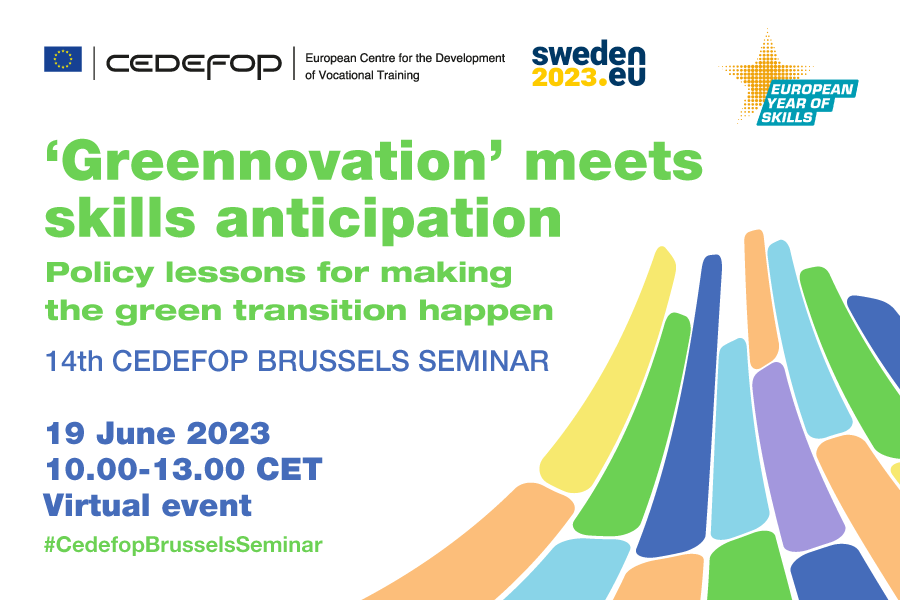KEHSIA participated in the 14th Cedefop Brussels Seminar titled “Grennovation meets skills anticipation: policy lessons for making the green transition happen.” This seminar, organised in collaboration with the rotating EU Presidency, focused on addressing key issues relevant to ongoing European discussions on vocational education and training (VET) and employment. It aimed to explore the skills required to drive innovation, the role of VET and skills anticipation in achieving the European Green Deal (EGD) objectives and the Green Deal Industrial Plan.
The 14th Cedefop Brussels Seminar specifically sought to answer two questions:
- First, what are the anticipated skill needs associated with green technological and social innovation, and how can VET effectively address them?
- Second, how do skills governance and innovative skills anticipation contribute to policy-making to facilitate the green transition?
During the seminar, Cedefop experts, alongside external experts, engaged in presentations, discussions, and debates exploring the interplay between VET, skills, technological advancements, and social innovation. They also examined the role of innovative skills anticipation and governance approaches in supporting the overall objectives of the green transition.
Skills for boosting the green transition
According to Cedefop experts, the ongoing “greening” of the labour market has generated a growing requirement for upskilling and reskilling of all workers. There is a need for vocational education and training (VET) programs to facilitate the transition of workers in the so-called “brown” sectors, as well as to equip future workers with the necessary skills for green jobs. Cedefop’s green observatory has identified four key areas that will drive future green jobs and skills: Smart and green cities, Agrifood, Circular economy and, Waste management.
To ensure a seamless green transition, effective collaboration among all stakeholders is essential, including policymakers, industries, and educational institutions. VET providers face specific challenges as they strive to recalibrate their educational offerings and tailor training to meet the evolving needs of learners and the job market. The seminar highlighted the vital role of up-to-date apprenticeship opportunities in equipping young people with the relevant skills sets to actively contribute to the green transition. The promotion of innovation involves the development of high-quality apprenticeships programs and the adaptation of existing ones to align with present and future needs of Europe.
Anticipating and matching skills
Anticipating and In today’s rapidly evolving labour market, the importance of skills anticipation cannot be overstated, as it plays a crucial role in effectively aligning workers’ competences with the needs and objectives of employers across all sectors.
Skills anticipation approaches must adapt to the evolving landscape, considering the diverse needs and aspirations of various stakeholders, especially during times of transition, increased volatility, and economic pressures. It is essential to involve and empower these stakeholders in the design and implementation in the design and implementation of skills anticipation processes, allowing them to drive the initiatives. Furthermore, the outcomes of such processes should be translated into practical policy actions, necessitating a comprehensive and sector-based skills governance approach that considers the entire skills ecosystem.
In recent years, numerous Member States have widened the range and scale of their skills anticipation methods and approaches. To enhance VET responsiveness to emerging needs and future labour market changes, it is vital for stakeholders and key players to prioritise strengthening the feedback loops between VET and the dynamic world of work, taking into account the specific realities of their national or regional contexts.
Cedefop actively supports member States in developing effective systems for skills anticipating and matching, primarily through its invaluable methodological guides and its innovative matching skills online tool.
Can’t wait for the 15th Seminar to learn more about VET and explore the dynamic shifts in the skills landscape!

